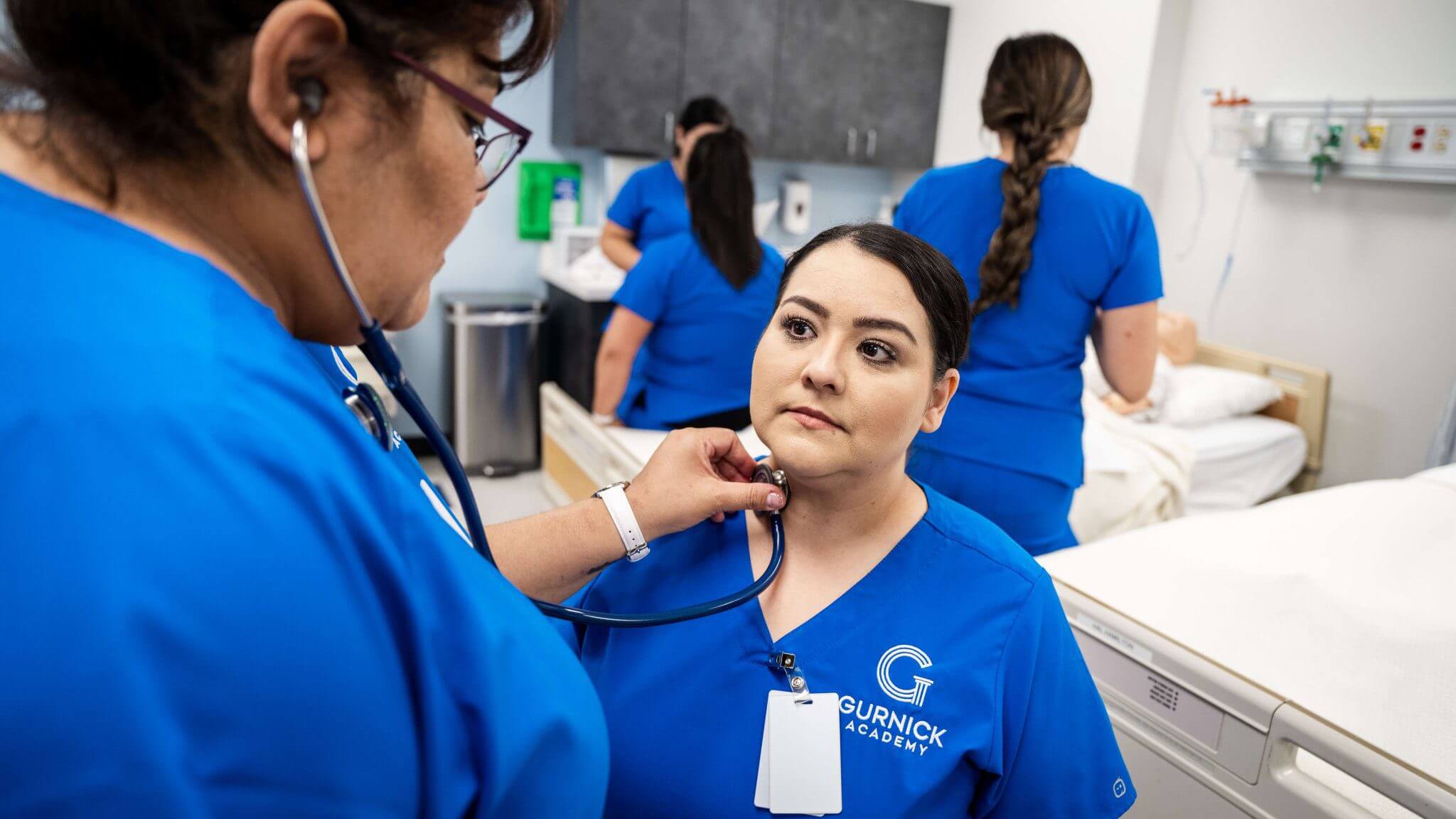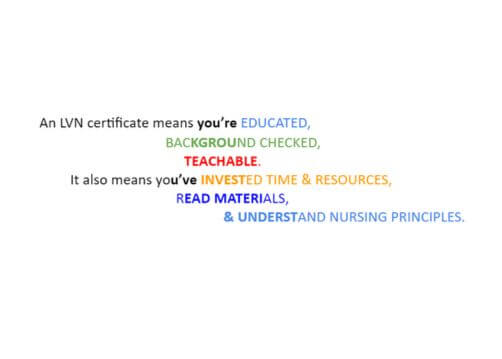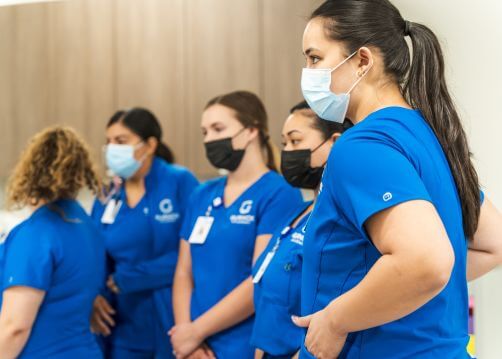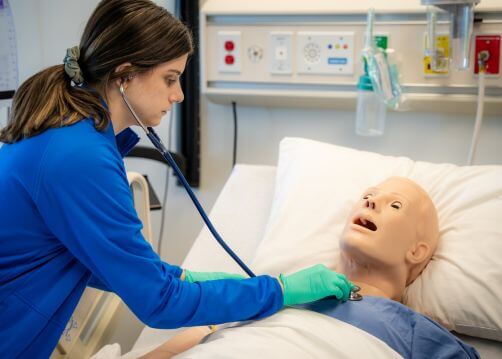How to Find a Good VN Program, Part II
Date: July 6, 2022
Four-year universities and community colleges vie for one’s scholarly attention, while two-year trade schools champion `world’s finest’ associate’s degree programs. Online classes and private schools tout `best prep for the NCLEX’ as vocational centers offer nursing clinical externships while proffering the `latest labs.’ With many ads citing the best nursing program just a click away,’ it can be confusing—even daunting, to know where to turn to find the perfect-for-you vocational nursing program. And selecting the proper route is a life decision comparable to purchasing a new home or automobile. Like the start of any journey, higher learning begins with answering two primary questions:
- “What is my destination?”
- “How to find a method or vehicle to get there?”
The first question, `What is my destination?` is best answered by distinguishing if a Licensed Vocational Nursing role is your forever vocation or if you wish to use Licensed Vocational Nursing as a stepping stone.
Many take Licensed Vocational Nursing as a bridge to work toward a Registered Nurse (RN) license with an associate degree in nursing (ADN). Or they go further to achieve a four-year BSN degree.
This article attempts to help you explore the second question, “What method or vehicle should I take to get there?” or “How to find a good program.” Educational roadways, like automobiles, should include four key areas when answering this question. Think of them as four solid “wheels” to navigate one’s educational route. According to Editor-in-Chief Rob Franek of The Princeton Review, would-be-students should critically analyze an educational entity by the following criteria:
- Academics
- Campus Culture
- Financial Aid
- Career Development1
1. Academics
Much like pacing a quality trip, the first factor or “wheel” along your educational route should be the academia of a prospective program. Paramount to academic success, one should verify if the school or program is accredited. Accreditation means a school voluntarily underwent a third-party evaluation and was found to meet a certain level of educational standards.”3 Criteria for accreditation consideration include faculty credentialing, academic rigor, student-learning outcomes, and other categories. The review process, managed by qualified professionals from nonprofit and non-governmental organizations, critically evaluates instructional entities.2 Liberal arts institutions often obtain regional accreditation, while vocational schools, trade schools, and religious institutions of higher learning typically receive theirs nationally.3
One can verify a college’s accreditation status and how the school rates on the Database of Postsecondary Institutions and Programs. The school must list the agencies that accredit their institution and programs, including the website, phone number, email, and mailing address. Doing so allows prospective students to confirm accreditation status or ask questions.2 Current students, former students, and graduates can submit claims or have issues addressed. Prospective students can review unresolved claims or schools with their accreditation status currently in review or at risk of removal.
The following is a list of recommended academic-related questions you should debate asking during your college exploratory phase. “What is the school’s retention rate? Do instructors pair theoretical knowledge with practical skills? How up-to-date are lab equipment and other materials? Do course modalities match my learning style? What is the teacher-to-student ratio? Does the school provide academic support for pupils? Are services such as tutoring, exam preparation, and practice for the NCLEX offered? Will adaptations require changes to my workspace? Will I need to buy a computer or purchase Wi-Fi? What clinicals and rotations are available?” Overall, the first and last question along your learning map or GPS should seek to answer, “Is this academic program for me?”
2. Campus Culture
The second “wheel” on one’s educational trajectory is to look at a prospective school’s campus culture. Take a good read of your travel compass; the direction of the campus is vital. Do its mission and vision align with yours? Consider asking some or all of the following questions.
“Is the campus culture made up of first-year-away-from-home partygoers that take entire days off for homecoming games? Or is the campus made of stable 5 AM study buddies who seriously tutor one another between two jobs, 1.5 children, and a career relaunch? Is the school’s focus on a featured department, with resources moving only in that direction? ” I.e., Is the administration focused only on an engineering department expansion at the expense of health and wellness departments? Does the campus culture align with my worldview? I.e., If you believe in traditional medicine, perhaps a campus focusing on homeopathic remedies isn’t the best fit.6
Next, assess the “pulse” of campus culture using authentic, outside-the-box questions as they compare to one’s work-life balance in determining a fit. Weigh practical issues such as whether the school is close to the sitter or the school my child attends. Is there a healthy grocery store nearby so that I can grab a gallon of milk on my way home? While seemingly trivial, these aspects could mean the difference in time, travel, and resources. Ask, “What is the ratio of evening and weekend classes compared to my work schedule?” Are teachers and staff members available?6
A distinguished campus (even if held online) will provide student services, outreach programs, and other extracurricular activities to balance learning fatigue and promote student well-being. Onsite and online? Recreation? You will spend a lot of time in your learning community, so you should like it. More than just health education—your education should also be healthy for you. Setting yourself up for academic success at the start of your journey is always a good route.
3. Financial Aid
The third “wheel” to evaluate your educational transport is financial aid. A reputable school should identify funding sources for assistance and know how to properly obtain and disperse those funds. Does your prospective school have an easy-to-navigate website with eligibility and application instructions for various scholarships, grants, and loans? Does that include state and private financial aid and the Free Application for Federal Student Aid (FAFSA)?2 Are details provided about scholarships, work grants, alum endowments, and merit-based awards?
Knowledgeable financial aid specialists should be able to explain and help you navigate the labyrinth of forms, deadlines, and award monies. They should also provide practical advice on how to take on an A+ education while not harnessing oneself into D-debt on the path to excellence. An investment is an investment, and all education can be profitable, yet a competent financial-aid professional will keep you from getting gouged. Are you paying for a Rolls-Royce experience yet only signing up for a Honda-level education? These professionals should have frank discussions with you, which include a Cost-Benefit and ROI analysis.2
4. Career Development
The fourth and final “wheel” is a school’s career development center. The end goal of college performance is a three-letter word: J-O-B. A school’s career center or career services department can serve as a passport into the wage-earning world. “These centers are specifically designed to assist students with honing job search skills, identifying and working toward career goals, finding suitable careers or graduate school programs, getting referrals to employers, and boosting networking skills. Usually, student fees cover these services. Alumni generally can access these services at any point in their careers, at no additional cost.”4
The Career Services department often works with agencies and provides practical items like portfolio creation and mock practice interview tips. Career centers can track industry trends and projections. Gurnick Academy of Medical Arts’ Career Services has a specific platform for professional development linking alums and students with Gurnick Edge’s toolkit. Consider asking your career services department some or all of the following questions:
- Are networking options available?
- What are the relationships between clinical sites to the school?
- Who are the school’s partnering agencies?
- What outlying agencies have relationships with the school?
Remember, companies frequently reach out to schools and recruit from their student and alums populations. Many campuses have connections with alums who also hire. Some health-related institutions search for recent graduates and provide student-loan forgiveness for accepting work in underserved hospitals or clinics upon graduation, making them natural employers. A robust career center is much like a sound passport—and a good one means you can ultimately enter your chosen destination.
As you investigate the right school and program for you, remember the four critical criteria:
- Academics;
- Campus Culture;
- Financial Aid;
- Career Development.
Summary
As much as you want to make yourself attractive to your future school of choice, your educational institution also seeks to appeal to quality student talent for its program pipelines. Ask questions. Weigh the pros and cons. Selecting an academic program is a significant life decision; dedicate appropriate time to conducting your research.
Citations:
1 Franek, Rob. “How to Find Your Best Fit College.” TPR Education IP Holdings, LLC. 2019. (Accessed January 29, 2021.)
2^ a, b, c, d n.d. “Determinants of Good College Programs.” Open Education Database. (Accessed January 29, 2021.)
3^a, b Staff, T. B. S. 2020. “All You Need to Know About Accreditation. 2020.” T.B.S. (Accessed August 28, 2020.)
4 Santina, Jessica. 2018. “How to Use Career Centers to Advance Your Career.” Learn How to Become, Getting the Most from Your College Resources. Written Nov. 14, 2018. (Accessed June 11, 2021.)
5 McCamish, Bethany. 2021. “The Complete Guide to Loan Forgiveness Programs for Doctors and Nurses in Rural Areas.” Student Loan Planner. April 30, 2021. (Accessed June 11, 2021.)
6^ a, b Carlevatti, Jen. 2017. “Top Factors to Consider When Choosing a College.” The University of South Florida. Nov.16, 2017. (Accessed June 11, 2021.)





